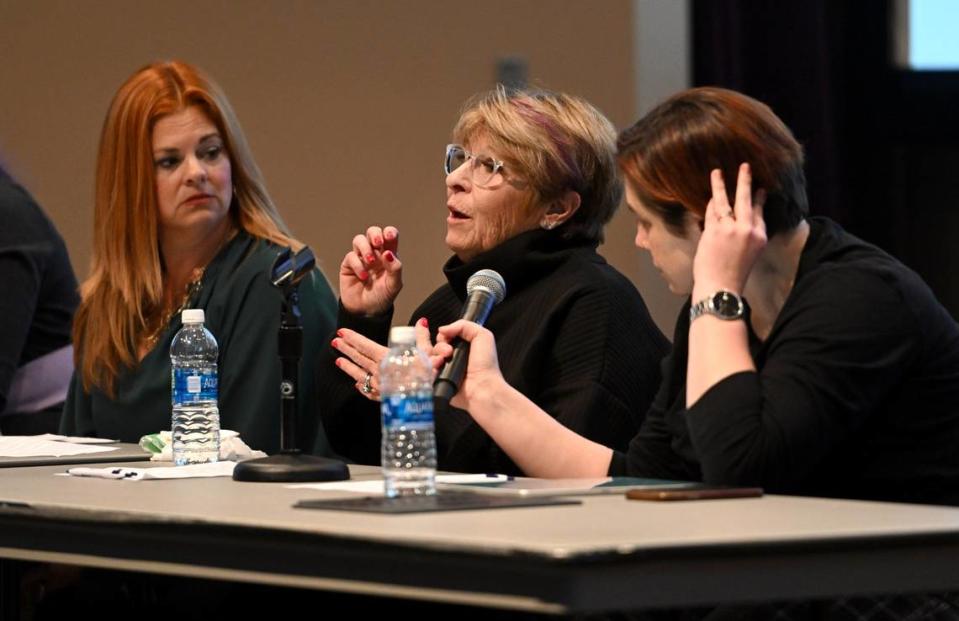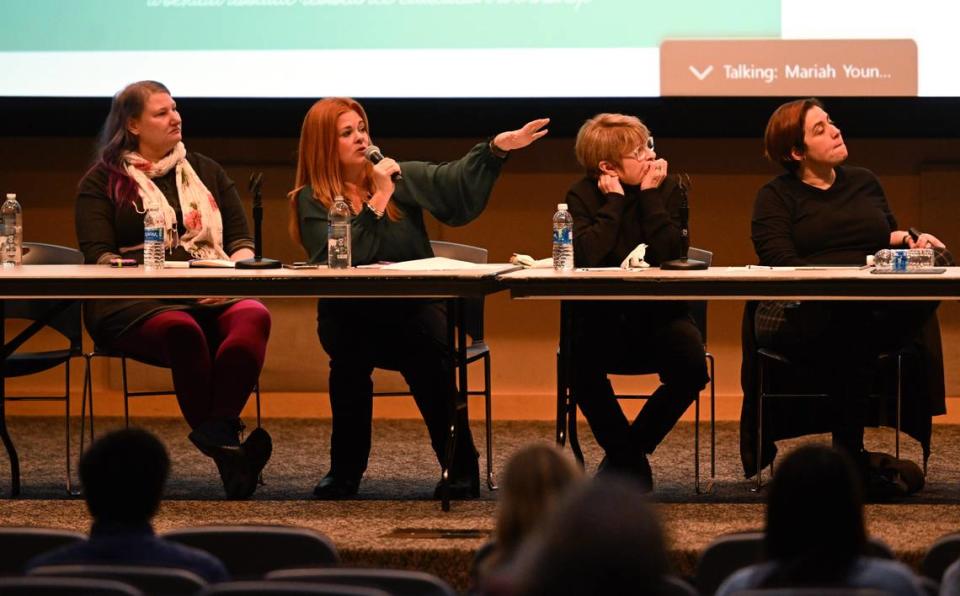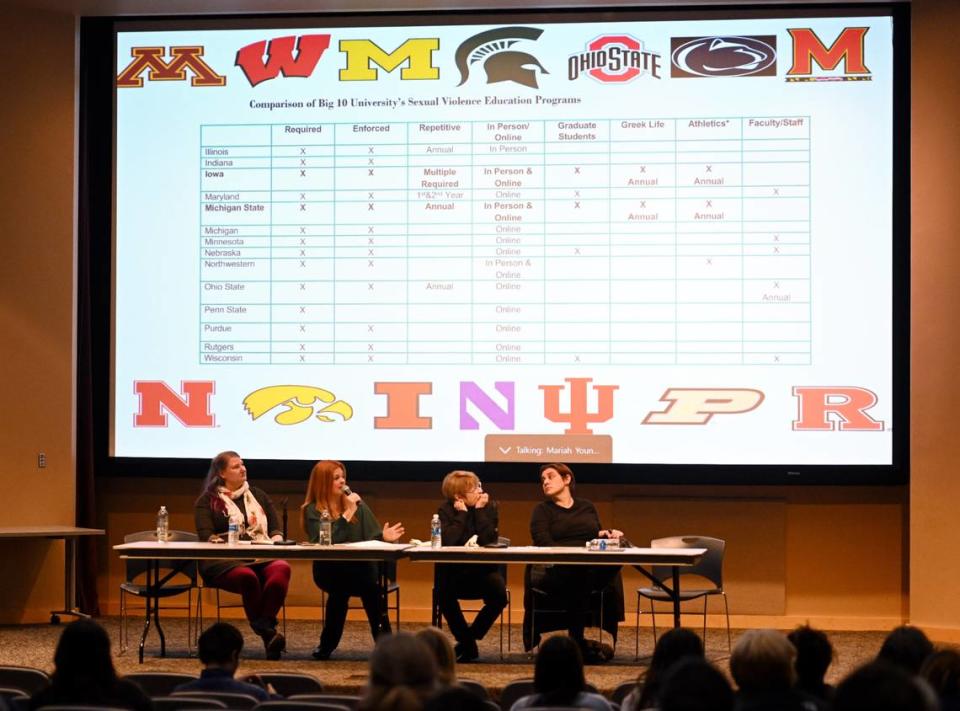Sexual assault survivor returns to Penn State 46 years later to discuss rape culture
For 45 years, she avoided Happy Valley — and the memories that accompanied her sexual assault there. For nearly five decades, she never told her story publicly. Never how she begged, repeatedly, for the man to let her go. Never how a sweaty Ace bandage was wrapped around her eyes so she couldn’t see. Never.
On Wednesday night, amid an audience filled with watery eyes, that finally changed.
Adrienne Williams, 69, steadied herself and spoke softly inside Penn State’s Freeman Auditorium, as part of a panel titled “Rape Culture on Campus.” An organizer explained to the 150-plus in attendance that remembrance is not about recalling the past to preserve it — but to disrupt the present. And that’s what Williams, whose story first surfaced on ESPN two years ago, intended to do.
“I’m going to be 70 years old this year,” Williams said, pausing for a moment, allowing the weight of her words to sink in. “I was 24 when this happened, 45 years ago. And yet I remember everything.”

She remembered what she was wearing, dark slacks with a yellow long-sleeve shirt from the Train Station, the downtown restaurant/bar where she waitressed. Over that was a tan zip-up sweater, with suede patches on the elbows. She remembered placing her key in the car door, not far from the Train Station, and feeling a push behind her so strong that she was thrown to the passenger side.
She was blindfolded. Athletic tape was wrapped around her hands to bind her. “Please, please, please!” she remembered pleading. “Please!” She remembered how she heard rumors about women being taken to the Penn State golf course to be raped. She wondered if she was next.
“As he was tying my hands behind my back, I ripped them apart,” she said. “And the locks on my car door were on the side, and I caught the lock and I jumped out of the car.”
Williams’ voice cracked. The silence in the auditorium was so deafening it seemed as if the slightest sniffle would echo off the walls. Some students wiped away tears; many others just stared straight ahead.
“... And I jumped out of the car with this thing hanging off my eyes and off my hands, and screamed,” she recalled, her voice again cracking. “And screamed.”
The assailant ran off.
Williams’ story lasted about 15 minutes. Whenever it seemed as if the memories became too much, whenever a frog began forming in her throat, she’d take a moment to steady herself before pressing on. She always pressed on.
Wednesday was the first time Williams told her story in a public setting, but it wasn’t the first time she told her story. Before the panel co-hosted by the Gender Equity Center and the Department of Women’s, Gender, and Sexuality Studies, the former art education major was interviewed by ESPN in 2022. Although she never saw her assailant’s face; based on his build and other details, she believed him to be Penn State football player Todd Hodne, a man who committed at least a dozen rapes and sexual assaults between Penn State and his hometown from 1978 to 1979. He died of cancer in prison in 2020.
Williams visited the Penn State campus Wednesday, her first trip back since graduating, to share her experience — and the impact it had on her. Williams’ story might’ve been the first assault many had heard in such detail, but sexual assault is hardly rare. And the trauma remains much too commonplace.
Some 62 reported rapes took place on and around Penn State’s campus between 2018-2020, based on the latest figures aggregated in a nonprofit database. But sexual assault, which Williams survived, has impacted more than 1 in 4 women at University Park, based on Penn State’s own surveys.

“Often, in a rape culture, we assume that this is just part of how it is. This is just normal, although awful, but this is kind of the way things are,” said panelist Jill Wood, a Penn State teaching professor and expert on sexual violence prevention/education. “But this isn’t inevitable, and we’re all here to talk about strategies that we can work to change.”
The success of prevention programs must be measured by results, the panelists agreed, including a nodding Williams. And based on the results — and the university’s surveys — Penn State isn’t doing enough. Few schools are.
Fewer than half of surveyed female undergrads at University Park believe Penn State would take a report of sexual misconduct seriously. Female undergrads feel less safe than they did in 2018, and fewer (52.6%) are talking to anyone about their own first-hand experiences.
This is a national issue with few easy answers. But local students organized a rally in fall 2021 around the issue, and both students and experts shared ideas and concerns then. Little has changed since.
Among the concerns then and now? Penn State’s sexual violence education program is lacking when compared to its Big Ten peers. PSU freshmen are required to undergo a brief online course — no longer than an hour — while other Big Ten schools such as Illinois, Michigan State and Ohio State require students to undergo their respective programs every year.

Studies suggest that student-athletes and fraternity members are three times more likely to commit sexual assault than their classmates. As a result, some schools — such as Iowa and Michigan State — require student-athletes and students in Greek life to undergo their programs annually. Penn State has no such requirements.
When Williams was in school, she felt Penn State placed greater emphasis on athletics than it did students. When the Jerry Sandusky child sex-abuse scandal surfaced, she felt the same way. And, today, she still hasn’t been persuaded otherwise.
Panel organizer Susanne Klausen — professor of women’s, gender, and sexuality studies — said she requested since November for someone from Penn State Athletics to join the panel. “But, as you can see, no one stepped forward,” she said, “which I find shocking as well as very disappointing.”
Instead, the four-person panel was represented by Williams, Wood, sexual assault nurse examiner Jocelyn Anderson and civil rights attorney Barrett Marshall. They talked about building a supportive community, the bureaucracy of Penn State, strained support services and where to get help.
Williams’ powerful story opened the event and set the tone after introductions. She recalled how, a week after her assault, she would weave nonstop for eight hours a day. How the color drained out of her world. How the police who interviewed her that night, at the hostess stand, didn’t even write anything down.
Similar stories like Williams’ play out across Penn State every year and, across the nation, every day. During the Q&A portion of Wednesday’s panel, students repeatedly asked what they could do. What does it matter that they care if the Penn State administration doesn’t? How do students get leaders to listen at the top?
Penn State alumni trustee Alvin de Levie, who sat quietly toward the front, raised his hand and addressed their concerns over a passed-around microphone. “I’m on the board of trustees, and I wanted to be here,” he said, clarifying he did not speak for the board. “And it’s getting to the top.”
Maybe change is coming. One panelist tried to end the event on a positive note by explaining a military court case, where a man was convicted on survivor testimony alone. Minds change over time, she said.
But, earlier in the night, Williams offered a more blunt viewpoint.
“It’s 2024,” she said. “And I feel as if nothing has changed since 1978.”
Resources
There are a number of local, state and national resources at the disposal of Penn State students and others in Centre County. Here is a list, much of which was compiled by the university:
On-campus
Center for Sexual and Gender Diversity: 814-863-1248
Counseling and Psychological Services (confidential): 814-863-0395
Gender Equity Center (confidential): 814-863-2027
Penn State Crisis Line: 877-229-6400
Penn State Crisis Text Line: Text “LIONS” to 741741
Penn State Hotline (anonymous reporting): 800-560-1637
Penn State Police: 814-863-1111
Safe Walk Program: 814-865-9255
University Health Services (confidential non-emergency care): 814-863-0774
UHS after-hours advice nurse (24 hours a day): 814-863-4463
University Ambulance Service (identify yourself as a student): 911
Off-campus
Centre Safe (24/7, confidential): 814-234-5050
Mount Nittany Medical Center (confidential emergency care): 814-234-6110
National Sexual Assault Hotline (confidential 24/7 hotline or live chat): 800-656-4673
Pennsylvania Coalition Against Rape: 888-772-7227 (immediate assistance); 800-692-7445 (general inquiries)
Rape, Abuse & Incest National Network (available 24/7): 800-656-4673
State College Police: 814-234-7150 or 911

